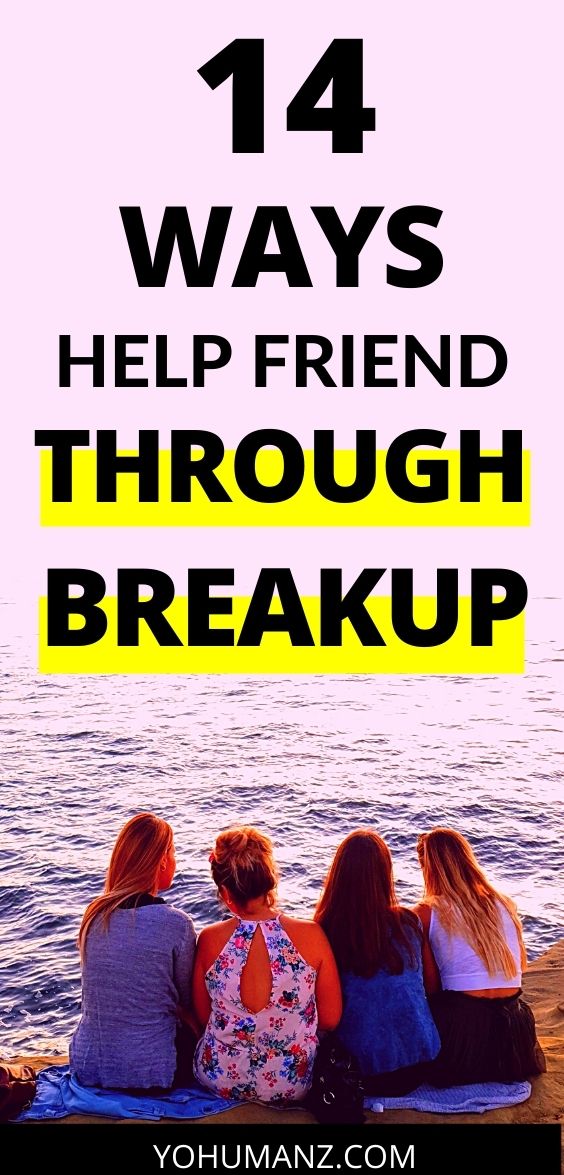Table of Contents
First of all, if you’re here, you are SO awesome.
That’s because, if you’re on this page, you’re trying to help your friend get over a breakup—which makes you an amazing person.
Turning to—instead of away from—someone’s pain makes you a strong person and a worthwhile friend.
With that being said, it’s not always easy to help a friend through this difficult time. That’s why we want to make it a bit easier for you.
14 Ways to Help Friend After Breakup

If you’re trying to help a friend after a breakup, here are a few things you can try to make their grief more manageable.
#1 Let Them Vent and Cry
When someone first breaks up with their partner, the first thing they probably need is someone to vent to. If you can, try to be there in person. If not, try to be there as much as you can over the phone or messaging. Whether you need to listen to the same complaint 10 times in one day or just hug them while they cry, being there means a lot.
You may not know what to say. But during this period, you may not need to say anything. Some friends may want you to ask questions about their breakup. Others may not want to talk about it at all, and may just want to cry or sit with you.
#2 Don’t Minimize Their Emotions
It doesn’t matter if the breakup happened months ago, you should never tell someone to “just get over it.” Or “they weren’t that good for you anyway.” Or “you didn’t know them that long so it’s not too bad.” Or “well I was with my ex 8 years so you can imagine how much worse that was.”
Realize that different people deal with heartbreak differently. You may be less emotional and heal quicker. Maybe your friend just got very attached to the person they broke up with. In any case, their feelings of sadness are valid, even if the person was bad for them. Instead of telling them why they should feel better or cutting to the silver lining, meet them where they are at.
#3 Ask What They Need
Often times, we assume what people need. But everyone is different and therefore will probably need different things. For example, some people want their friends to be there ASAP so they can rant and cry. Other people, like myself, need a few days to cry by themselves and process their own emotions first.
People may need different types of help too. For example, if your friend lived with her ex, she may need physical help moving. Or she may need help looking for an apartment. But if you don’t ask and she doesn’t outright tell you, you won’t know.
Try to ask something like:
- “What’s the best way I can support you right now?”
- “What’s the best thing I can do for you right now?”
- “Is there anything practical you need help with, like washing dishes, meals, etc.?”
- “Would you like me to come over now or would you like a bit of space first?”
#4 Help with Practical Things
As mentioned above, there’s circumstances where you friend doesn’t just need emotional support, but practical support too.
If they’re going through a divorce or lived with their partner, they may be looking to move. So they may need your help packing or getting things into order.
In other cases, your friend may be so devastated that she can barely take care of herself. For example, during my first breakup, I couldn’t eat. I had no interest in cooking or eating. I had to use Ensure drinks to get some calories in my body. But one day, my cousin brought over some pasta my aunt had cooked. Even though I didn’t “feel” like eating, I still recall it as one of the best pastas I’ve ever had.
If your friend is so into their grief that they’re neglecting household chores, you can help out with that too. For example:
- Cooking
- Cleaning
- Washing dishes
- Doing laundry
- Taking their dog to the dog park
- Taking their children out for a bit so they can have alone time
#5 Get them a Breakup Gift
Let’s be real: Gifts don’t solve heartbreak. However, they can help your friend feel like they’re still cared for. And, since nobody ever expects a “breakup gift,” it will probably feel extra special to them.
So, what’s a breakup gift? Really, it could be anything that you think your friend would like. What I would suggest is making a small gift basket filled with different items. Here’s a few ideas:
- A box filled with items of the same color (ex. yellow for “happiness box”)
- A “Get Over Them” box filled with snacks, eye drops for crying, fish candies (fish in the sea), something to make them laugh
- A “Eat Your Feelings” box with a variety of comfort food snacks
- A “You are beautiful” box filled with their favorite beauty items
- A “Box of Sunshine” filled with scrolls featuring positive messages for them
For more visual ideas, check out our Pinterest board “Breakup Gifts.”
#6 Balance Their Rose-Colored Glasses
When we get out of a relationship, we have a tendency to overstate how good our ex was. Instead of thinking about the negatives that led to the breakup, we think about all the things we’ll miss.
It’s fine to do this for the first while, but if you notice your friend staying in this space, gently try to remind them of their ex’s downfalls. There’s a large caveat here though: If you talk negative about their ex and they end up reuniting, there will likely be harsh feelings toward you. You also don’t want to crap talk a friend’s ex to the point of degrading the person and their relationship. That is not helping your friend after a breakup.
However, if you know they’re likely broken up for good and they’re still thinking too highly of their ex, brainstorm ways you can balance out their thinking. Being blunt about how much the ex sucks isn’t a good idea. Instead, see if there’s questions you can ask that will lead your friend to come to their own conclusions. For example:
- “You seem to be mentioning all of the good things about him, what WON’T you miss?”
- “When I broke up with my ex, I thought of all his positives, but I noticed it was more realistic to think of his negatives too. There must be a few things you didn’t like about him?”
- “Do you ever feel relieved in a sense, because now, even if a long time from now, you get to meet someone without [these negative traits]?”
#7 Make Them See the Benefits
Again, breaking up isn’t all bad. Even though it’s a horrible feeling, there’s at least a few positives depending on their situation.
A big caveat here though: Nobody likes a Positive Polly Pocket. You need to let your friend vent, feel their feelings and miss their ex. You can’t sprinkle positivity on a breakup and expect your friend to feel better. However, you can gently inculpate positive points into the conversation. If your friend rejects them, that’s ok, they may ruminate over them later. Or, they may see your point automatically. If they say “stop being positive about this,” listen to what they need and stop.
Here are a few examples of breakup benefits you can work into conversations:
- They get to order the takeout they like
- Nobody will steal their food anymore (more for your friend)
- They have more time to pursue hobbies or reinvent themselves
- They can meet someone who treats them better
- They don’t have to sit through really boring TV shows anymore
- They can do the [really annoying thing] they avoided doing around their partner
For more ideas, read 22 Bright Sides to Breaking Up. See which apply to your friend and gently share them with her. If she’s open to the idea, you can sit down with her and write a list of all the benefits.
#8 Get Them Social
When we’re depressed, many of us have a tendency to shy away from the world like a wounded animal. That’s ok for a period of time. But eventually, your friend will need to get back out into the world and have some sense of normalcy. Not only that, but socializing can help them feel better and help your friend with a breakup.
If you can, try to take them out. This could mean to a bar, restaurant, movie theatre, museum or just a walk. Anything that gets them out of the house can remind them that there’s a large world outside of themselves welcoming them back. You could also organize group friend activities or encourage them to reach out to family members to reconnect.
#9 Suggest New Activities
Breakups are a great time to try something new. That’s because you’re starting a new beginning anyway. But also because they’ll have extra free time that they shouldn’t be using to think about their ex. If they haven’t already, suggest taking up a new hobby or activity. If they’re too depressed to try something new alone, you can join them and make it a friend date. Ideas for new activities could include:
- A paint night
- Knitting
- Learning cooking
- Going to the gym
- Doing at home workouts
- Crafting
- Making jewelry
- Learning new dances
#10 Check-In
Throughout the first few days of their breakup, many people will gush about their grievances and you may not need to reach out. However, if you have a shy friend who’s not always open, you may need to ask more questions to make them feel comfortable (but never pry).
After the first days though, your friend may be reaching out less. It’s important to realize that that doesn’t necessarily mean they’re over the breakup. They could just be trying to annoy you less or they have nothing new to say. Still, you should reach out to check-in. Even saying something simple like, “how are you feeling today?” can make them feel like someone is still on their side and caring about how they’re feeling.
This can be especially true if your friend feels like they should be “over it” already. They may feel shame for feeling that deeply, especially if their ex was total crap to them. They may feel like an idiot for still liking somebody so horrible. In an effort to hide that, they may force themselves to stop bringing it up, acting like it’s normal again. Although this can be part of the healing process, doing a check-in will let you know if they still need emotional support.
I was listening to a podcast one time and the host mentioned that when somebody first loses a loved one, everyone reaches out. But in the weeks, months and first year that follows, the amount of people checking in becomes less and less. She said, for that reason, she always makes sure to do the opposite—reach out even long after the event. I think the same is true for breakups too. Your friend’s family may be giving them support right away because they see how much pain they’re currently going through. But as the pain becomes less visible, they receive less support, even though the pain is actually still there. That can be and feel really isolating. So, checking in even after the first bit can be a good idea.
#11 Get Them Moving
Breakups are typically a time of intense sadness, so doing something that is known to elevate emotions is a great idea.
Exercise has been proven to release endorphins, which are the body’s feel-good chemical. This effect has been linked to decreases in depression and anxiety, making it perfect to try during this time.
Of course, for most people, suggesting to go do a workout while they’re balling their eyes out is not the best idea. However, after they’ve calmed down a bit, you can suggest something less intense. Anything that gets their body moving can help:
- Going for a walk
- Going for a jog
- YouTubing a dance tutorial
- Doing a yoga session with them
- Experimenting with pilates
- Biking
- Playing beach volleyball
- Kicking around a soccer ball
#12 Let Them Browse Your Dating Profile
While your friend is revering from a breakup, they will probably need some time before jumping back into the dating pool. Actually, they should take their time. Serial dating is likely to create more problems than it will ever solve.
However, while your friend is still healing, you can meet them in the middle. Instead of signing them up for a dating profile, you can let them scroll through yours. What’s the point in that? Well, although they won’t message anyone, looking through their options can give them hope. For example, if they’re so hung up that their ex was the only guy for them, seeing so many cute, kind single guys can lift their spirits. Instead of thinking there’s no options, they’re alerted of a world of opportunity waiting for them when they’re ready.
#13 Kindly Tell Them When You Need Breaks
Again, you are an awesome friend for reading this post. However, you need to care about yourself too. Especially through tough breakups, being someone’s support person can be demanding and difficult. You need to take time for yourself to relax, recharge and do your own thing. That’s ok, normal and very necessary. Here are some tips to draw boundaries:
- Gently say no when you have prior plans
- If you’re tired and your friend asks you to come over, simply say “sorry, I can’t right now” (no explanation required)
- It’s ok to say, “Sorry, I’m just really needing time to myself today to recharge.”
- It’s ok to say, “I’m having a hard time talking about this right now, but I can sit with you and play a game or watch a movie.”
- Enlist other friends to be there for your friend when you can’t
- Encourage them that spending time alone is part of the healing process
#14 Know You Can’t Fix It
Some people are natural “fixers.” They want to automatically fix a situation, losing sight of the nuances. For example, don’t tell your friend “ok, here’s what to do to get over your ex,” and then proceed listing the steps. This is heartbreak, not a manual.
Other people know that they can’t heal others, but are still very disappointed when they can’t.
While helping a friend after a breakup, keep in the forefront your goal: to provide support in the best way you can. Whether that support moves mountains or nothing, you can’t really control. Some breakups are tough and nothing you do will make your friend feel better. Still, having support can bring a glimmer of hope.
Summary: How to Help Friend with Breakup
When trying to help friend with a breakup, make sure to give them time to talk, vent and cry. Without minimizing their emotions, hear them out and let them feel their feelings. Then, you can move on to practical things you can do for them or introducing new activities to get them out of the house. When in doubt, you can always ask your friend what they need. Above all else, pay attention to yourself and how you’re feeling. You’re a good person for trying to help your friend after a breakup, but you need to preserve your energy too. When things are getting too much for you, it’s appropriate to draw boundaries and keep them.



